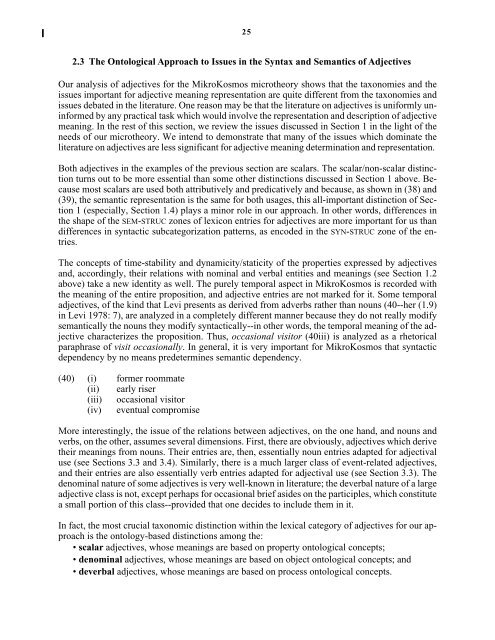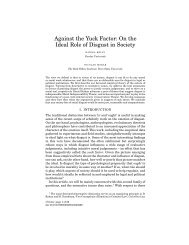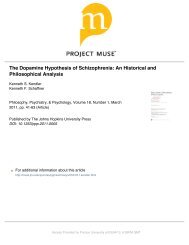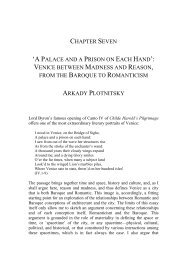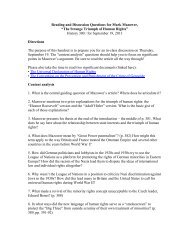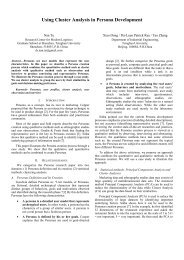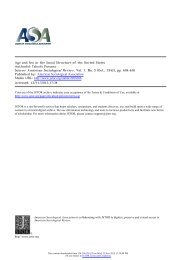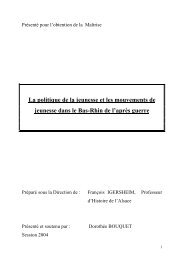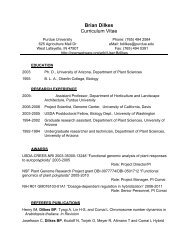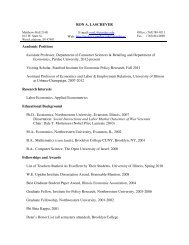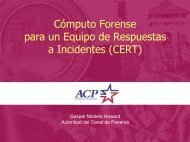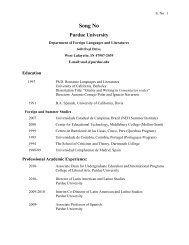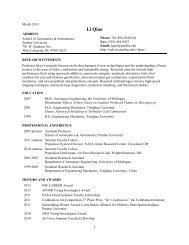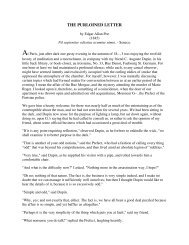Lexical Semantics of Adjectives - CiteSeerX
Lexical Semantics of Adjectives - CiteSeerX
Lexical Semantics of Adjectives - CiteSeerX
Create successful ePaper yourself
Turn your PDF publications into a flip-book with our unique Google optimized e-Paper software.
25<br />
2.3 The Ontological Approach to Issues in the Syntax and <strong>Semantics</strong> <strong>of</strong> <strong>Adjectives</strong><br />
Our analysis <strong>of</strong> adjectives for the MikroKosmos microtheory shows that the taxonomies and the<br />
issues important for adjective meaning representation are quite different from the taxonomies and<br />
issues debated in the literature. One reason may be that the literature on adjectives is uniformly uninformed<br />
by any practical task which would involve the representation and description <strong>of</strong> adjective<br />
meaning. In the rest <strong>of</strong> this section, we review the issues discussed in Section 1 in the light <strong>of</strong> the<br />
needs <strong>of</strong> our microtheory. We intend to demonstrate that many <strong>of</strong> the issues which dominate the<br />
literature on adjectives are less significant for adjective meaning determination and representation.<br />
Both adjectives in the examples <strong>of</strong> the previous section are scalars. The scalar/non-scalar distinction<br />
turns out to be more essential than some other distinctions discussed in Section 1 above. Because<br />
most scalars are used both attributively and predicatively and because, as shown in (38) and<br />
(39), the semantic representation is the same for both usages, this all-important distinction <strong>of</strong> Section<br />
1 (especially, Section 1.4) plays a minor role in our approach. In other words, differences in<br />
the shape <strong>of</strong> the SEM-STRUC zones <strong>of</strong> lexicon entries for adjectives are more important for us than<br />
differences in syntactic subcategorization patterns, as encoded in the SYN-STRUC zone <strong>of</strong> the entries.<br />
The concepts <strong>of</strong> time-stability and dynamicity/staticity <strong>of</strong> the properties expressed by adjectives<br />
and, accordingly, their relations with nominal and verbal entities and meanings (see Section 1.2<br />
above) take a new identity as well. The purely temporal aspect in MikroKosmos is recorded with<br />
the meaning <strong>of</strong> the entire proposition, and adjective entries are not marked for it. Some temporal<br />
adjectives, <strong>of</strong> the kind that Levi presents as derived from adverbs rather than nouns (40--her (1.9)<br />
in Levi 1978: 7), are analyzed in a completely different manner because they do not really modify<br />
semantically the nouns they modify syntactically--in other words, the temporal meaning <strong>of</strong> the adjective<br />
characterizes the proposition. Thus, occasional visitor (40iii) is analyzed as a rhetorical<br />
paraphrase <strong>of</strong> visit occasionally. In general, it is very important for MikroKosmos that syntactic<br />
dependency by no means predetermines semantic dependency.<br />
(40) (i) former roommate<br />
(ii) early riser<br />
(iii) occasional visitor<br />
(iv) eventual compromise<br />
More interestingly, the issue <strong>of</strong> the relations between adjectives, on the one hand, and nouns and<br />
verbs, on the other, assumes several dimensions. First, there are obviously, adjectives which derive<br />
their meanings from nouns. Their entries are, then, essentially noun entries adapted for adjectival<br />
use (see Sections 3.3 and 3.4). Similarly, there is a much larger class <strong>of</strong> event-related adjectives,<br />
and their entries are also essentially verb entries adapted for adjectival use (see Section 3.3). The<br />
denominal nature <strong>of</strong> some adjectives is very well-known in literature; the deverbal nature <strong>of</strong> a large<br />
adjective class is not, except perhaps for occasional brief asides on the participles, which constitute<br />
a small portion <strong>of</strong> this class--provided that one decides to include them in it.<br />
In fact, the most crucial taxonomic distinction within the lexical category <strong>of</strong> adjectives for our approach<br />
is the ontology-based distinctions among the:<br />
• scalar adjectives, whose meanings are based on property ontological concepts;<br />
• denominal adjectives, whose meanings are based on object ontological concepts; and<br />
• deverbal adjectives, whose meanings are based on process ontological concepts.


